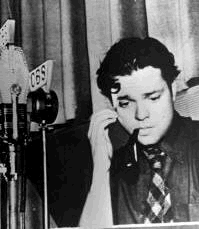Orson Welles

Best known for his airing of "War of the Worlds", Orson Welles made numerous appearances on a variety of different shows during his radio career.
Between 1936 and 1941, Orson Welles was involved in more than a hundred radio drama productions as writer, actor and director. From this and his films, he is considered one of the outstanding figures in American creative arts. He continued on radio through the early 1950's.
Radio was the golden key to his rise to fame. In September of 1937, Welles became the initially unaccredited lead in the popular radio series, The Shadow. Writer Walter E. Gibson had created the character for the pulps, but The Shadow really grew in popularity due to the radio show. From the first, Welles did the scripts with no rehearsal which, along with his wonderful voice and acting, gave the overtly melodramatic scripts an intelligence and urgency that was very different from other adventures on the radio dial.
Doing radio shows during the day, Welles and John Houseman worked nights producing a dramatic series in New York City - The Mercury Theater. The work was excellently received but was politically charged to the point of attempted governmental shutdown. Welles was offered a slot on the radio for his actors in 1938 and each week they would do a full hour of quality drama. The Mercury Theater embraced thrillers such as Dracula and War of the Worlds, and the classics of literature such as Pickwick Papers and Tale of Two Cities. The notoriety of War of the Worlds got Campbell Soups interested, and so the new Campbell Playhouse continued where the Mercury Theater left off, with the same great actors and quality treatments of dramatic classic and original material, some by Welles himself.
Orson continued to be a star, and made many appearances on almost all the major radio shows of the time, as well as continuing dramatic work on such shows as Norman Corwin's prestigious Columbia Theater Workshop and Suspense.
Later in Welles career after the creation of his great film, The Third Man, the BBC offered him a radio series to work off the audience recognition of the main character. The Third Man, subtitled The Adventures of Harry Lime, was done in 1951 - 52 by the BBC, transcribed for America. As Harry Lime, Welles is able to be suave yet duplicitous while working some scam or other for a hasty profit. Lovers of noir and the hardboiled school will admire Welles' subtle European variation on the theme.
During that same period, Orson found time to do The Black Museum. This was Scotland Yard's "mausoleum of murder," a "repository of crime." As narrator, Welles walked through the echoing museum, picking an common object and relating its criminal past.
For other Orson Welles appearances, see also Suspense, Black Museum, The Third Man and Mysterious Traveler.
47 shows on 1 CD.
This CD is in the MP3 format.